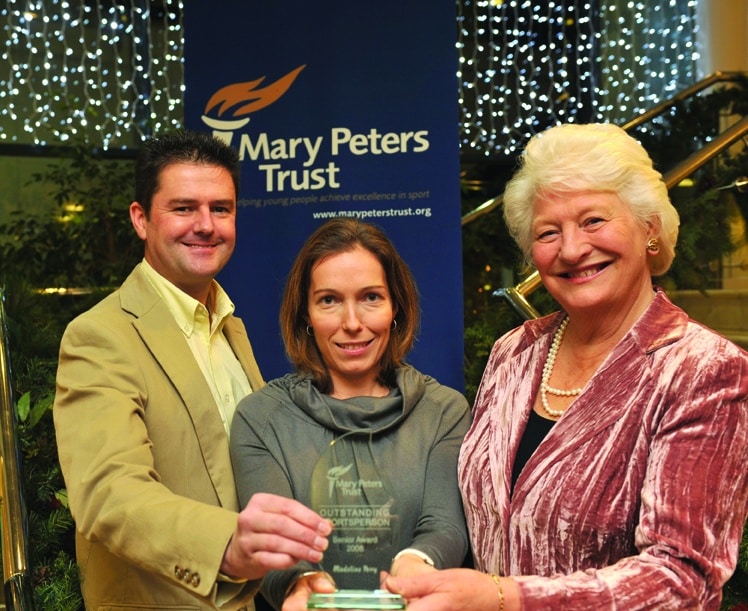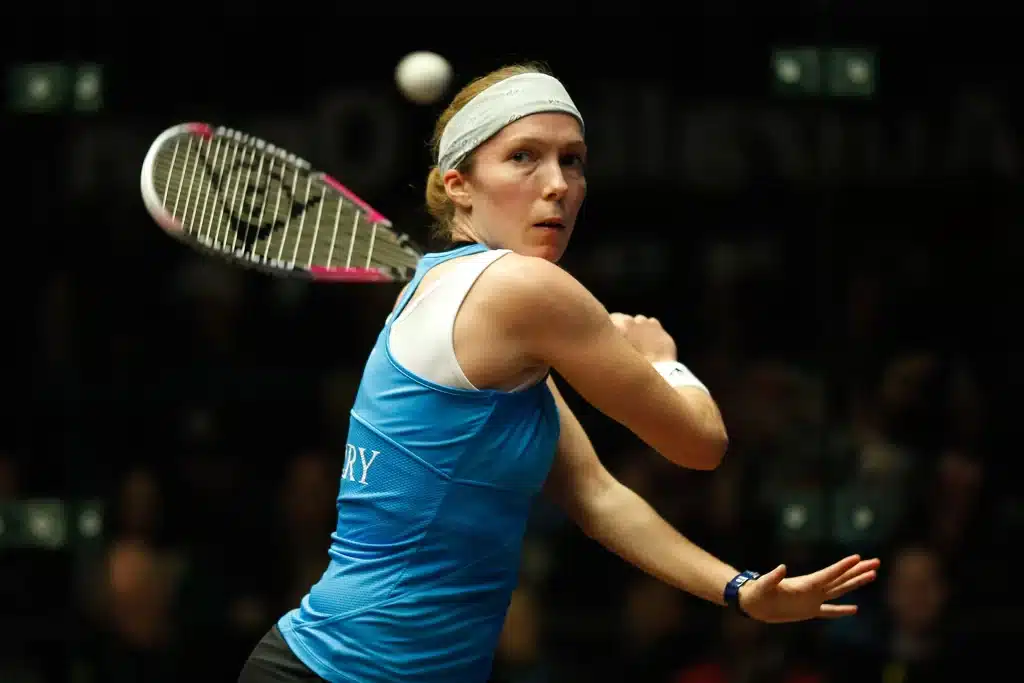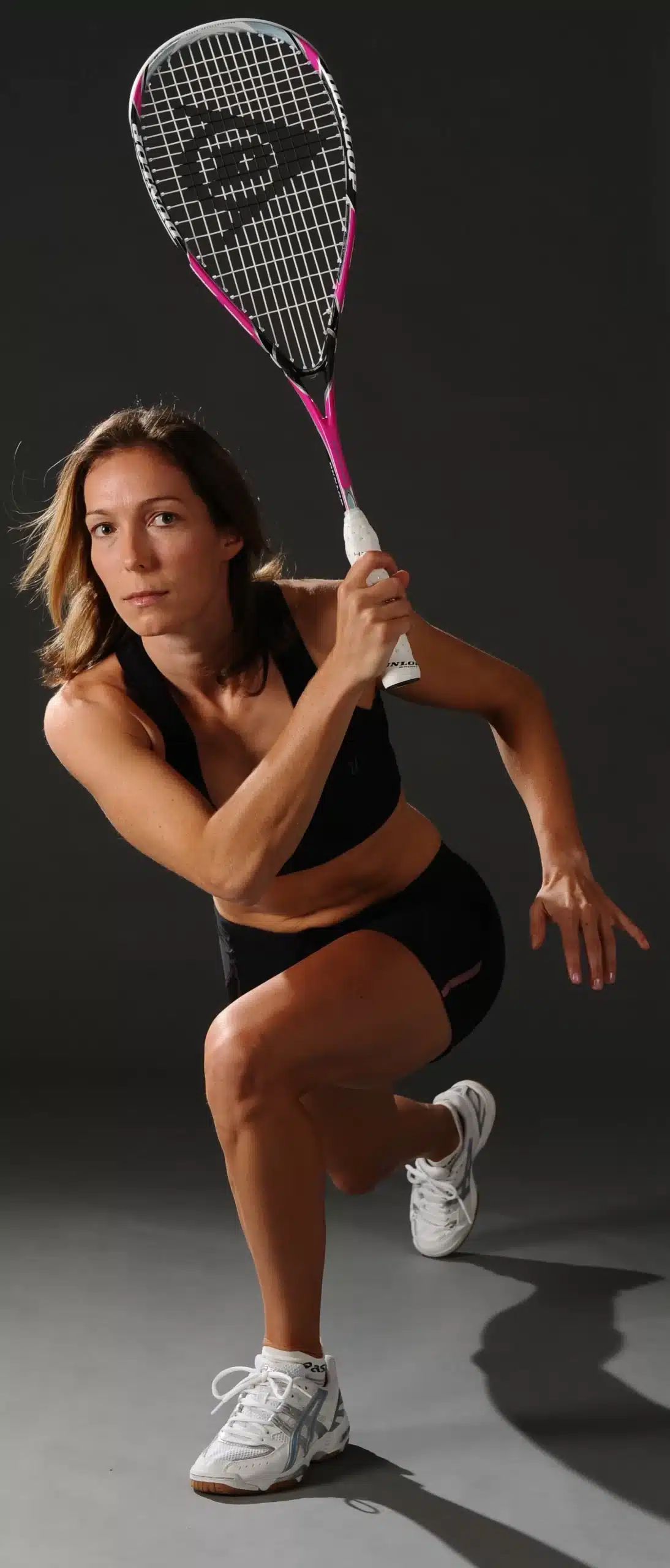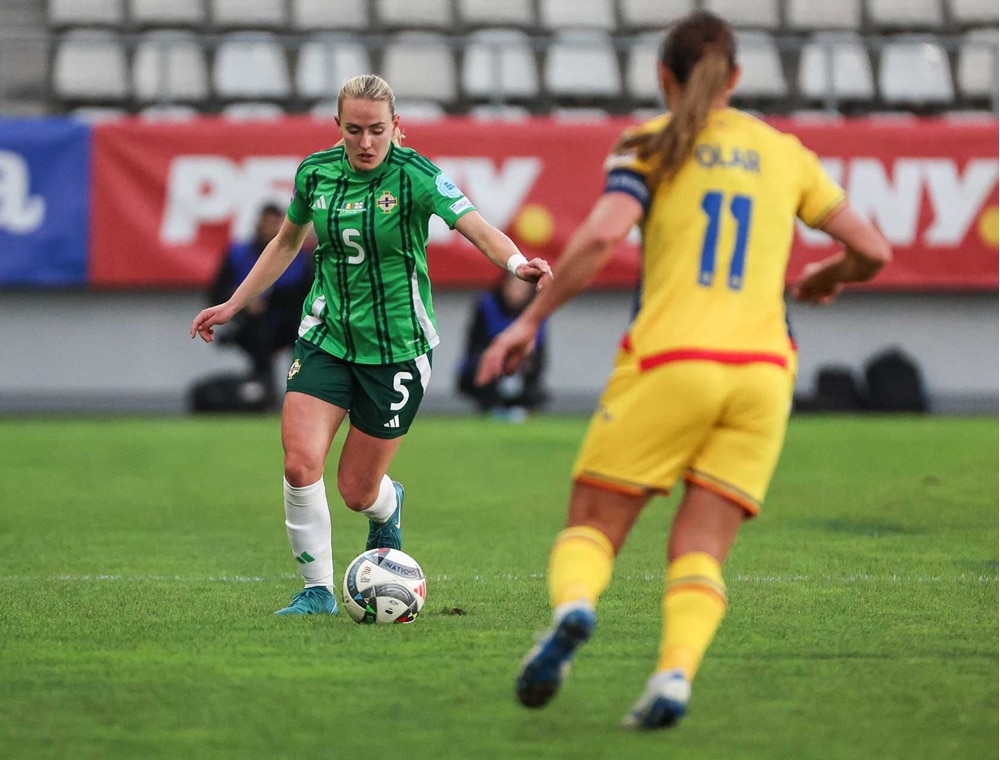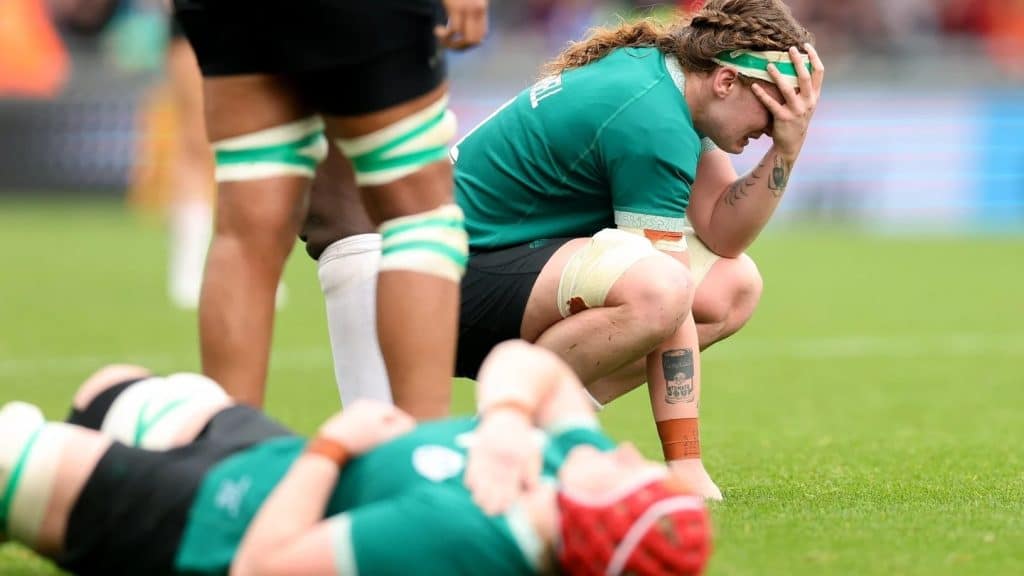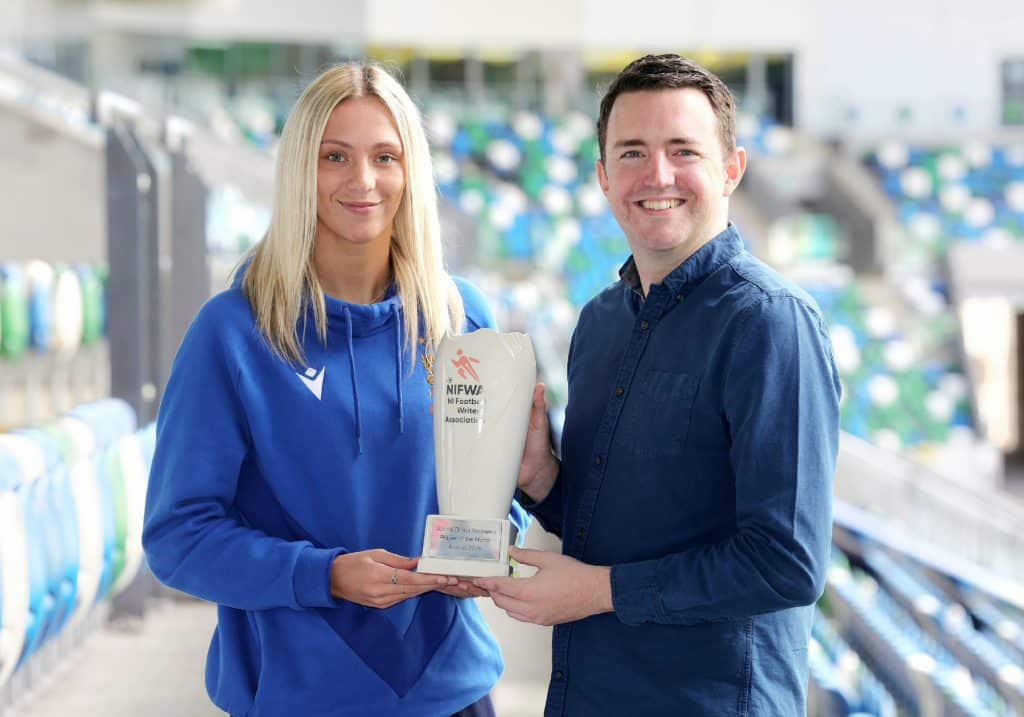SQUASH is going through a resurgence in Ireland – north and south – and it’s the girls who are leading the field. In Northern Ireland eight of the top players are female.
Northern Ireland’s most famous squash champion, Banbridge’s Madeline Perry, looks back on a stellar sporting career and talks about the development of squash internationally and at grass roots level as well as the opportunities for young people locally to reach squash’s top tier.
A former Mary Peters Trust supported athlete, Madeline Perry is a real inspiration to Northern Ireland’s new crop of potential squash champions, many of whom are currently funded by Mary’s Trust.
Back in April 2024, the Irish Ladies team won the European Division 3 Championship and three of those four players hail from Northern Ireland – Hannah Craig, Emma Lundy and Hannah McGugan. Other up and coming young female players are teenagers Shriya Drawid (below) and Lydia McQuillen – both still students at school.
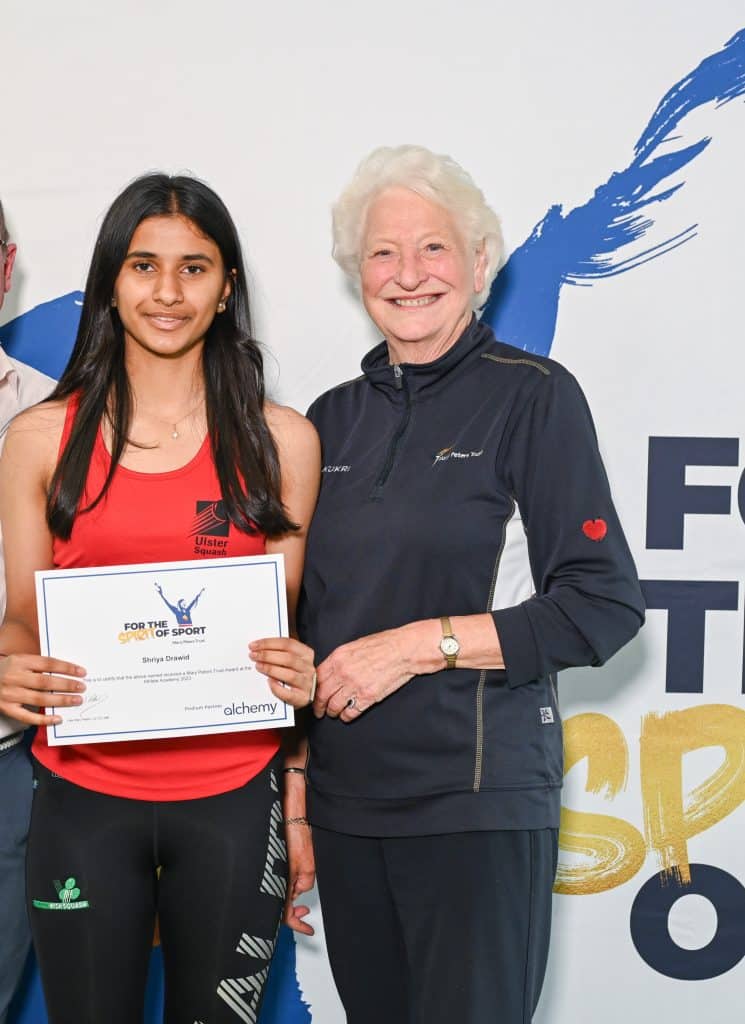
Whilst all eyes are currently on Paris 2024, these young squash players will have their sights set on the 2028 Los Angeles Olympics when squash will feature as an Olympic sport for the very first time, as well as looking beyond LA to the Brisbane 2032 Games.
Madeline played throughout the 1990s and the noughties reaching a career high world ranking of No 3 during 2011. She secured a bronze in the 2008 World Championships in Manchester and in April 2014 made squash history as the oldest female player to retain a top 10 position when she was ranked No9 in the world. She also competed for Northern Ireland in five Commonwealth Games, from the 1998 Kuala Lumpur Games to the 2014 Commonwealth Games in Glasgow.
Now 47, Madeline and her husband live in Philadelphia where she coaches squash.
“I retired from professional squash back in 2016 and spent a year as a coach in Australia. I’m now Director of Squash at a school in Philadelphia and loving the experience,” Madeline relates.
“Compared to American Football, Ice Hockey and Basketball, squash is a lower-key sport. But it’s growing. Courts aren’t as accessible as they are in Ireland and the UK as they are usually part of a private sports club or private school complex. But many more courts are being built and it’s also a college sport. School sport is a big thing in America and a lot of kids want to go to college to play a sport.
“Squash is certainly much bigger now than when I first came to the States to play the game 20 years ago. America is producing a lot of good players, and the country attracts high calibre experienced coaches.
“Egypt is without doubt the current powerhouse of squash. Thousands of juniors play the sport and are coming through the ranks to senior levels – and they win everything. The top 10 players in the world – both male and female – usually features five or six Egyptians. Their players have great personalities and great style. They are good fun to watch.
“England has been a past powerhouse, also Australia – both had a drop off but are definitely coming back to the top.”
It was in her hometown of Banbridge, where her parents still live, that Madeline first took up squash.
“My parents played squash before I was born,” Madeline said. “Me and my two younger sisters were really into sport at school. We were hugely self-motivated, and our parents got us signed up to different sporting clubs and groups. We still enjoy sport as a family. My sisters are pretty good at squash and are very competitive.
“You never lose that competitiveness – even when you retire. That aggressive competitor mode still comes on when I play tennis or golf socially. When I play tennis, I think I’m Roger Federer and when I play golf, I’m Rory McIlroy!
“It’s wonderful to try different sports that I simply didn’t have time for before. I still play squash – but not as much as I used to, of course.”
Madeline grew up playing at the squash courts in Banbridge Swimming Pool complex. She then went to study at Queen’s University, Belfast and moved to Belfast Boat Club. She also played for CIYMS in a men’s league team. It was back in 1993 that she was first funded by the Mary Peters Trust.
After Madeline left college, she turned professional and moved to England where she played for a club in Halifax, insisting: “It was a good fit for me.”
When asked for her most memorable victory, Madeline says without hesitation: “Definitely defeating Nicole David in the 2009 British Open quarter finals. Nicole had been unbeaten for most of that year – in fact she lost to very few people during her whole career, so it was a big deal for me to win.”
For those old enough to remember the 1970s and 1980s, squash was a massive leisure sport in Northern Ireland and throughout the world. Locally there were 18 leagues. As a sport it dropped off and became less popular. Fortunately, it’s going through a renaissance in NI and further afield.
In Northern Ireland, leagues are developing and juniors are coming through the ranks which augers well for the next number of Olympic Games.
Madeline says: “When I travel around the world, I meet a lot of people from clubs which were set up in the 70s and 80s eras. Those clubs are now going through a development phase, creating a good environment for people to go and play in.
“During my squash career we tried so hard to secure squash a place as an Olympic sport. Being on the Olympic list creates opportunities for more funding to help develop the sport which is very important for grass roots and for those clubs.
“Now that it’s an Olympic Sport (from 2028) that can only be a positive – players now have LA and Brisbane to strive for. As a young player starting out, it’s an amazing goal to be inspired by. An Olympic medal is a big deal – it would have been lovely to have.
“I come back home once a year and it’s great to catch up with old friends and competitors and find out what’s happening in Ulster and Irish squash. There are so many up-and-coming players and like me, many are being supported by the Mary Peters Trust. When you are starting out, funding grants are vital to development. It’s brilliant to know that the girls are doing very well. Hannah Craig who has turned professional and is now based in the States, is amazing. She’s now in the World Top 100 which is big deal.
“I would at some stage love to help the juniors back home in Northern Ireland and enable them to benefit from my experience as a player and a coach.”
Reflecting on squash as a spectator sport and the media’s reporting of it, Madeline says: “Many courts now are designed with glass walls so that the public and TV cameras can follow the game better.
“The glass walls have something in them that picks out the white ball. Since I stopped playing professionally in 2016, television coverage is so much better and matches are shown on channels such as Amazon Prime.
“They’ve also installed courts in exotic places. I’ve played in courts in shopping malls and on the Cayman Islands – right by the beach. It’s so much easier for spectators to watch. Then with increased media coverage, squash players become more well-known. In tennis and golf all the top players are world famous – so it’s good to get that kind of cycle going in squash. Then with expanded media coverage comes more funding for the sport. It’s a ‘win win’ for everyone and as an Olympic sport squash is set to get even better. I can’t wait to see how the future for squash plays out.”
